Navigating the VA System
VA Disability Qualification for Hearing Loss

Did you realize that more than 20% of veterans suffer from hearing loss or tinnitus due to their time in the service? These auditory issues frequently stem from being exposed to loud sounds and various risks while on active duty, and can profoundly affect a veteran’s life quality. Luckily, the Department of Veterans Affairs (VA) provides a means for these veterans to be eligible for disability benefits, offering compensation and access to the treatments they need.
Key Takeaways:
- More than 20% of veterans suffer from hearing loss or tinnitus.
- The VA provides disability benefits for eligible veterans with hearing loss.
- Eligibility is based on the connection between hearing loss and military service.
- Disability ratings determine the level of compensation and benefits.
- Treatment options for hearing loss range from blockage removal to advanced medical devices like cochlear implants.
Causes of Hearing Loss in Veterans
Hearing loss in veterans can be attributed to various factors, including exposure to loud noises, injuries from blasts, environmental hazards, age-related hearing loss, and faulty protective equipment such as the 3M earplugs.
One of the primary causes of hearing loss among veterans is prolonged exposure to loud noises during military service. The constant exposure to gunfire, explosions, and equipment noise can significantly impact auditory health.
“The sound of gunfire was ever-present during our deployments. We never realized the long-term consequences it could have on our hearing,” says Sergeant Smith, a retired army veteran.
Faulty protective equipment can also contribute to hearing loss. In the case of the 3M earplugs, veterans relied on them for hearing protection, unaware that they may have been defective, failing to provide adequate noise reduction and putting their hearing at risk.

Furthermore, injuries from blasts, such as those caused by improvised explosive devices (IEDs), can have severe and immediate impacts on hearing. The concussive force generated by these explosions can damage the structures of the inner ear and result in permanent hearing loss.
Environmental hazards present in military settings can also contribute to hearing loss. Exposure to jet fuel and other harmful substances may damage the auditory system over time, leading to hearing impairment.
- Exposure to loud noises
- Injuries from blasts
- Environmental hazards
- Age-related hearing loss
Lastly, age-related hearing loss is a natural process that affects many individuals, including veterans. As people age, their auditory system undergoes changes, leading to a gradual decline in hearing abilities.
Prevention is key
Although hearing loss is a prevalent issue among veterans, steps can be taken to prevent or minimize its impact. Increased awareness of the dangers posed by loud noises, the importance of using proper hearing protection, and regular hearing screenings can help protect veterans’ hearing health.
Treatment Options for Hearing Loss
When it comes to treating hearing loss, there are several options available to improve auditory function and enhance overall quality of life. The choice of treatment depends on the underlying cause and severity of the hearing loss. Here are some common treatment options:
1. Blockage Removal
Blockages in the ear, such as excessive earwax or foreign objects, can hinder sound transmission and result in hearing loss. Blockage removal is a simple and effective solution that can restore hearing. This procedure is typically performed by a healthcare professional using specialized tools.
2. Corticosteroids
Corticosteroids are medications that can help reduce inflammation and swelling in the hearing organs. They are commonly used to treat sudden sensorineural hearing loss, which is characterized by a rapid onset of hearing loss and can be caused by various factors. Corticosteroids can help improve hearing when administered promptly.
3. Hearing Aids
Hearing aids are small electronic devices that amplify sounds, making them easier to hear for individuals with hearing loss. These devices come in a variety of styles and technologies to suit different needs and preferences. Modern hearing aids are discreet, comfortable, and offer advanced features for personalized hearing enhancement.

4. Cochlear Implants
Cochlear implants are electronic devices that provide a sense of sound to individuals with profound hearing loss or deafness. Unlike hearing aids that amplify sounds, cochlear implants bypass the damaged parts of the inner ear and directly stimulate the auditory nerve, allowing users to perceive sound signals. This technology is particularly beneficial for individuals who do not benefit from conventional hearing aids.
5. Medications
Medications may be prescribed to manage specific types of hearing loss. For example, antibiotics can help treat middle ear infections, while antiviral drugs may be used to address viral-related hearing loss. It’s important to consult with a healthcare professional to determine the appropriate medication for the underlying cause of hearing loss.
It’s worth noting that the effectiveness of these treatment options can vary depending on the individual and the specific nature of their hearing loss. Consulting with a healthcare professional or hearing specialist is crucial for accurate diagnosis and personalized treatment recommendations.
VA Disability Benefits for Hearing Loss
Veterans suffering from hearing loss and tinnitus may be eligible for VA disability benefits. These two conditions are among the most common impairments that lead to disability benefits for veterans. To qualify for these benefits, veterans need to establish a connection between their hearing loss and military service.
Eligibility for VA disability benefits for hearing loss is based on the severity of the impairment. The VA assigns disability ratings that determine the extent of compensation veterans may receive. These ratings take into account the degree of functional impairment caused by the hearing loss.
To establish eligibility for VA disability benefits, veterans must provide evidence of service connection. This requires demonstrating that the hearing loss is linked to their military service. Medical records, including diagnoses and treatment history, as well as statements from fellow service members, can serve as supporting evidence.
Disability ratings range from 0 to 100 percent, with higher ratings indicating more severe hearing loss. The specific disability rating determines the level of compensation a veteran may receive. In addition to monthly compensation, veterans with dependents may be eligible for additional benefits.
It is important for veterans to gather the necessary documentation and undergo a Compensation and Pension (C&P) examination to support their claim for VA disability benefits. The examination evaluates the extent of the hearing loss to determine the appropriate disability rating.
By applying for VA disability benefits for hearing loss, veterans can receive financial compensation and access necessary medical care and treatments, such as hearing aids or cochlear implants, to improve their quality of life.
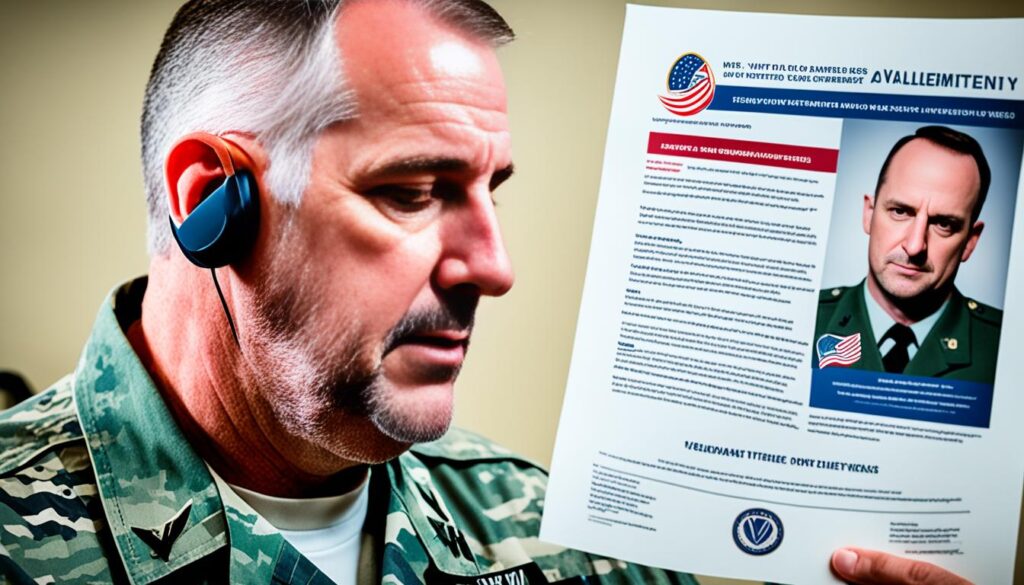
| Disability Rating | Compensation Rate (2021) |
|---|---|
| 0% | No compensation |
| 10% | $144.14 per month |
| 30% | $435.69 per month |
| 50% | $893.43 per month |
| 100% | $3,146.42 per month |
Calculation of Disability Ratings for Hearing Loss
The VA utilizes a numerical formula to determine the disability rating for hearing loss. This rating system ranges from zero to 100 percent and is crucial in determining the eligibility for cash benefits and treatment options.
For hearing loss, typical disability ratings range from zero to 10 percent. However, more severe cases of hearing loss may qualify for higher ratings, allowing veterans to receive increased compensation and access to specialized treatments.
Veterans with service-connected hearing loss are entitled to comprehensive treatment at VA facilities. This ensures that they receive the necessary care and support to manage their condition and enhance their quality of life.
Understanding the disability rating calculation is essential for veterans seeking VA benefits for hearing loss. It establishes the level of compensation they may receive and helps determine the appropriate course of treatment for their specific needs.
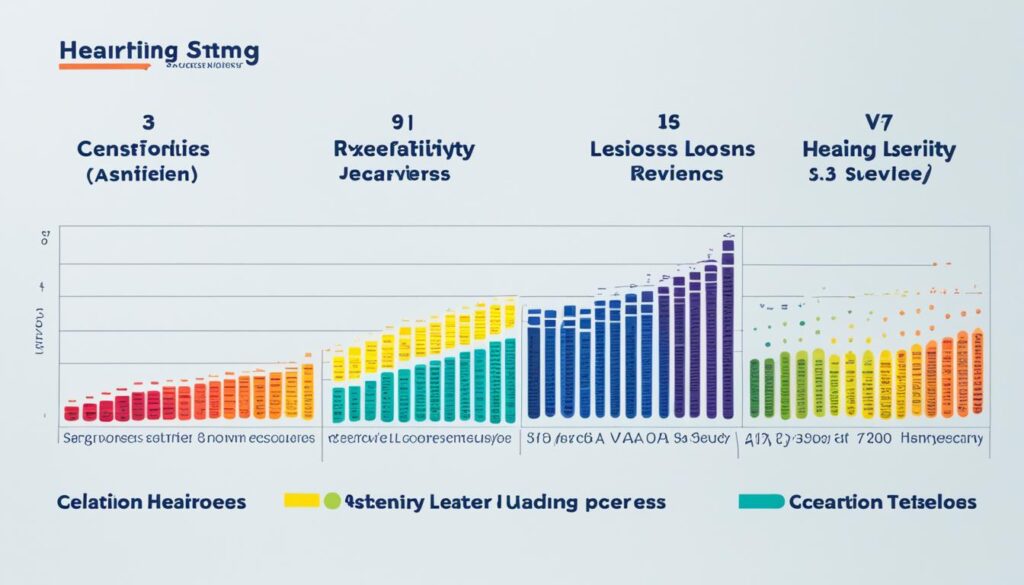
“The disability rating is instrumental in determining the disability compensation and benefits that veterans with hearing loss can receive.”
Factors Affecting VA Hearing Loss Benefits
VA hearing loss benefits are contingent on proving eligibility through service connection. Several factors play a key role in determining the extent of compensation and benefits for veterans with hearing loss.
- History of Active Duty: Veterans need to demonstrate a history of active duty in the military to establish their eligibility for hearing loss benefits. This includes providing relevant service records and documentation.
- Disability Rating: The VA calculates disability ratings to assess the severity of the hearing loss. These ratings determine the level of compensation and benefits that veterans may receive. The disability rating is usually based on assessments performed by licensed audiologists.
- Proof of Service Connection: It is essential for veterans to establish a clear connection between their hearing loss and their military service. This requires providing medical evidence and documentation linking the hearing loss to their time in the armed forces.
- Hearing Loss Tests: Licensed audiologists conduct various tests to evaluate the degree of hearing loss in veterans. These tests may include pure tone audiometry, controlled speech discrimination, and other assessments to determine the extent of impairment.
“Properly documenting your history of active duty, obtaining a disability rating, providing proof of service connection, and undergoing hearing loss tests are crucial steps in the process of obtaining VA hearing loss benefits.”
Veterans with higher disability ratings are generally eligible for increased compensation and additional benefits to support their hearing loss-related needs. It is important to work with experienced professionals who can guide veterans through the complex process of filing disability claims and gathering the necessary evidence.

| Disability Rating | Description |
|---|---|
| 0% | No hearing loss |
| 10% | Minimal hearing loss |
| 30% | Moderate hearing loss |
| 60% | Severe hearing loss |
| 100% | Total hearing loss |
VA Disability Benefits for Tinnitus
Veterans with service-connected tinnitus are eligible for VA disability benefits. The VA assigns a disability rating of 10 percent for tinnitus, reflecting the impact of this condition on veterans’ lives.
With the approved disability rating, veterans with service-connected tinnitus are entitled to compensation for their condition. This compensation provides financial support to help veterans cope with the challenges associated with tinnitus. It can be used to cover medical expenses, support daily living expenses, and improve overall quality of life.
Furthermore, veterans with service-connected tinnitus have access to treatment options at VA facilities. The VA recognizes the importance of addressing tinnitus and offers specialized care to relieve symptoms and improve the well-being of veterans. Treatment options may include counseling, sound therapies, and support services tailored to manage tinnitus-related difficulties.
“Tinnitus can significantly impact a veteran’s life, affecting their sleep, concentration, and emotional well-being. We recognize the importance of providing support and resources to veterans with service-connected tinnitus.”
Veterans who experience a worsening of their tinnitus can file claims for increased disability ratings. As the severity of their tinnitus increases, veterans may be eligible for higher disability ratings and corresponding compensation.

Other Ear Diseases and Injuries Eligible for VA Disability Rating
While hearing loss and tinnitus are the most common auditory conditions that lead to VA disability benefits, there are other ear diseases and injuries that may also qualify for auditory injury disability ratings. These conditions can have a significant impact on an individual’s auditory function and overall quality of life.
Cancer
Individuals diagnosed with cancer of the ear may be eligible for a disability rating of 100 percent for a specified period. The severity and treatment plan will determine the duration of the disability rating. Cancer treatments, including surgery, radiation therapy, and chemotherapy, can have long-term effects on hearing health.
Peripheral Vestibular Disorders
Peripheral vestibular disorders affect the inner ear and can cause dizziness, vertigo, and balance problems. These conditions can be rated at either 10 or 30 percent, depending on the severity. Peripheral vestibular disorders can significantly impact a person’s ability to function and may require ongoing medical management.
Loss of One or Both Ears
Individuals who have lost one or both ears may qualify for disability ratings ranging from 30 to 50 percent. The severity of the loss, including whether it is partial or complete, will determine the specific rating. The loss of one or both ears can have a profound impact on communication, spatial awareness, and overall well-being.
Condition Disability Rating Cancer of the Ear 100% Peripheral Vestibular Disorders 10% or 30% Loss of One Ear 30% Loss of Both Ears 50%
These disability ratings reflect the impact of these conditions on auditory function and the resulting effects on an individual’s daily life. The ratings determine the level of compensation and benefits that veterans may be entitled to receive.
It is essential for veterans with these ear diseases and injuries to seek appropriate medical documentation and evidence to support their VA disability claims. Consultation with medical professionals and guidance from VA-accredited representatives can help navigate the claims process successfully.

Establishing Service Connection for Hearing Loss
To receive VA disability benefits for hearing loss, veterans must establish a direct service connection. This process involves several essential steps:
- Obtaining a current diagnosis of hearing loss from a qualified medical professional.
- Gathering evidence of an in-service event that may have caused or contributed to the hearing loss. This evidence can include service records, incident reports, or statements from fellow servicemembers who witnessed the event.
- Obtaining a medical nexus opinion that links the in-service event to the current diagnosis of hearing loss. A medical nexus opinion is a professional medical opinion that establishes the connection between the in-service event and the current condition.
Once these steps are completed, veterans may need to undergo Compensation and Pension (C&P) examinations. These examinations assess the extent of the disability and provide further evidence to support the service connection claim. C&P examinations are typically conducted by VA healthcare professionals or contracted examiners.
Establishing a direct service connection is essential for veterans seeking VA disability benefits for hearing loss. It requires a current diagnosis, evidence of an in-service event, a medical nexus opinion, and potentially C&P examinations to strengthen the service connection claim.

Evidence and Documentation for Hearing Loss Claims
In addition to medical evidence, there are several other types of documentation that can strengthen hearing loss claims and increase the chances of a successful VA disability application. These additional pieces of evidence can provide crucial support and validation for the veteran’s condition:
Treatment Notes
Providing treatment notes from healthcare professionals can be instrumental in establishing a chronic condition and the ongoing nature of the hearing loss. These treatment notes should clearly outline the diagnosis, the prescribed treatments, and any follow-up appointments or interventions that have taken place. Including this documentation demonstrates that the hearing loss is an ongoing and significant issue that requires medical attention.
Accommodations
Documentation of accommodations made for the veteran’s hearing loss can strengthen the claim for disability benefits. This may include records of hearing aids, amplification systems, or any other assistive devices provided to the veteran to accommodate their hearing loss. Each accommodation should be clearly described, along with the specific benefits it provides in terms of improving communication and functionality for the individual.
Lay Testimony
The testimonies of the veteran and their family members can have a powerful impact on the disability claim. Lay testimony refers to the personal experiences and observations of individuals who have directly witnessed the impact of the hearing loss on the veteran’s daily life, relationships, and overall well-being. These testimonies provide a subjective perspective on the disability and can help the VA understand the true extent and consequences of the hearing loss.
By gathering and submitting this additional evidence, veterans can strengthen their hearing loss claims and enhance their chances of receiving the disability benefits they deserve. The combination of medical evidence, treatment notes, accommodations documentation, and lay testimony creates a compelling case that highlights the chronic nature of the condition and its significant impact on the individual’s life.
Next, we will explore how the VA assigns disability ratings for hearing loss, providing valuable insights into the compensation levels and additional benefits that veterans may be eligible for.
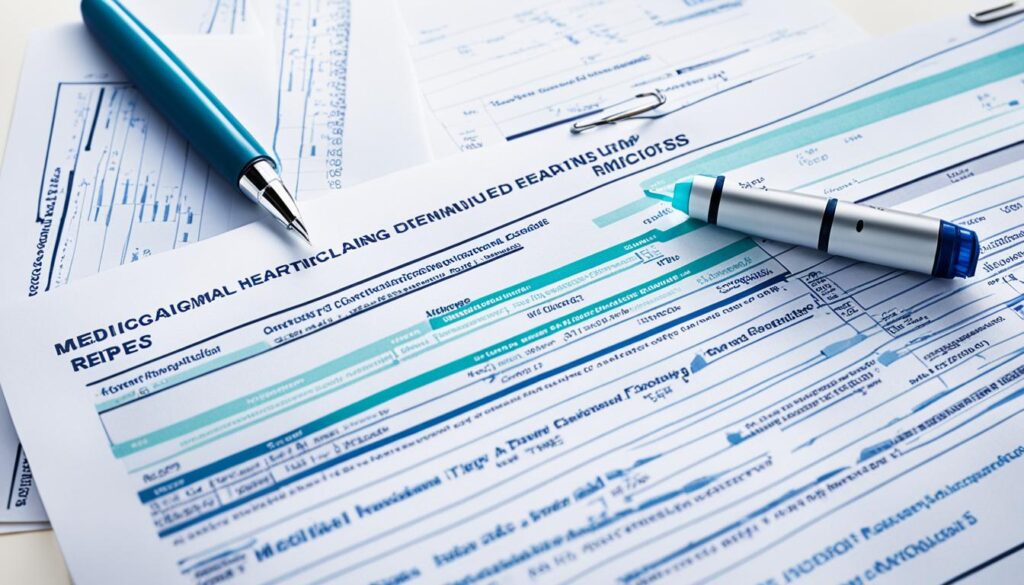
VA Disability Ratings for Hearing Loss
When it comes to VA disability benefits for hearing loss, the assigned disability rating plays a crucial role. The VA determines disability ratings for hearing loss based on the results of the pure tone threshold test, which measures the severity of hearing loss at different frequencies. These ratings range from 0 to 100 percent, with higher ratings indicating more severe hearing loss.
The disability rating chart for hearing loss serves as a guideline for determining the level of compensation veterans may receive. The chart outlines the correlation between the disability rating and the amount of monthly compensation. Higher ratings generally lead to higher monthly compensation.
Furthermore, veterans with higher disability ratings may also qualify for additional benefits for their dependents. These benefits can provide essential financial support to eligible dependents, offering assistance with education, healthcare, and other expenses.
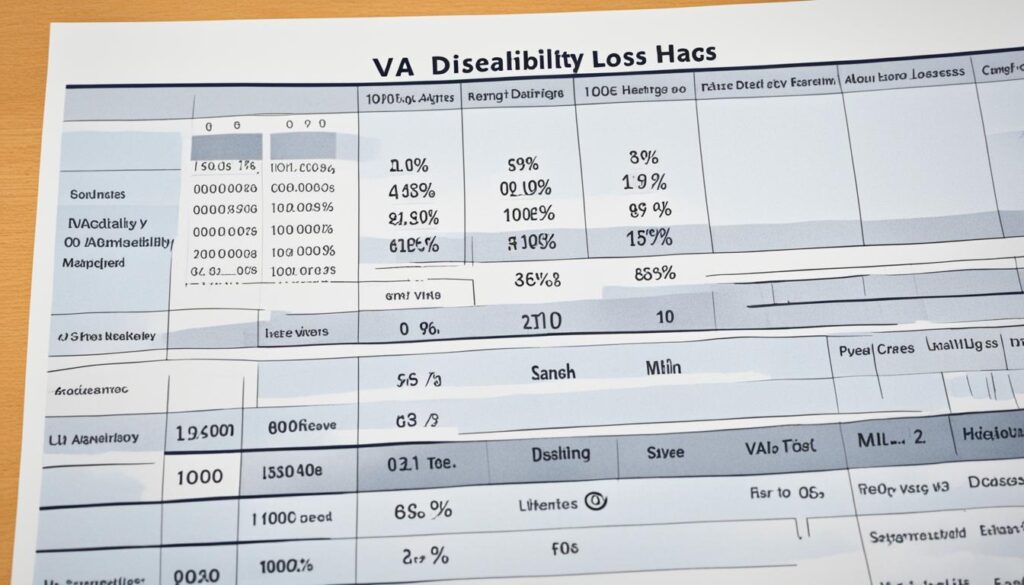
“The disability rating assigned to hearing loss can significantly impact a veteran’s benefits and overall quality of life. It is essential to undergo the pure tone threshold test and accurately document the severity of hearing loss to ensure a fair disability rating.”
Conclusion
In conclusion, veterans with hearing loss may qualify for VA disability benefits based on the severity of their condition, the connection to military service, and the disability rating assigned by the VA. It is important for veterans to gather the necessary evidence, undergo appropriate tests, and seek professional assistance to navigate the claims process successfully.
By providing compensation and treatment options, the VA aims to support veterans in managing their auditory health and improving their quality of life. Veterans can explore various treatment options such as blockage removal, corticosteroids, hearing aids, cochlear implants, and medication to address their specific hearing loss needs.
Establishing service connection is crucial in order to qualify for VA disability benefits. Veterans need to demonstrate the link between their hearing loss and their military service, which can be done through medical documentation, C&P examinations, and expert opinions. Additionally, evidence such as treatment notes and accommodations further strengthen the veterans’ claims.
Overall, the VA disability benefits for hearing loss provide a vital support system for veterans, ensuring they receive the necessary compensation and treatment for their service-related auditory conditions. It is recommended that veterans consult with VA representatives or veterans service organizations to fully understand the eligibility requirements and navigate the claims process with ease.
The percentage of hearing loss that qualifies for VA disability depends on the severity. The VA uses a numerical rating scale from zero to 100 percent, with higher ratings indicating more severe hearing loss and greater eligibility for benefits.
Hearing loss in veterans can be caused by exposure to loud noises such as gunfire, aircraft, and equipment noise. Faulty protective equipment like the 3M earplugs and injuries from blasts or environmental hazards can also contribute to hearing loss. Age-related hearing loss is also common among veterans. Treatment options for hearing loss include removal of blockages such as wax or foreign objects, medication like corticosteroids to reduce inflammation, and the use of hearing aids or cochlear implants to amplify sound or mimic inner ear function.
Veterans with hearing loss may qualify for VA disability benefits by establishing a service connection between their hearing loss and their military service. This requires evidence of an in-service event that caused or contributed to the hearing loss, a current diagnosis, and a medical nexus opinion linking the in-service event to the condition.
Disability ratings for hearing loss are calculated by the VA based on the results of a pure tone threshold test. Ratings range from zero to 100 percent, with higher ratings indicating more severe hearing loss. The amount of monthly compensation received depends on the disability rating.
Factors that affect VA hearing loss benefits include service connection, a history of active duty, hearing loss tests conducted by licensed audiologists, and disability ratings determined by the VA.
Veterans with service-connected tinnitus are typically eligible for VA disability benefits. A disability rating of 10 percent is commonly assigned for tinnitus. Benefits include compensation and treatment at VA facilities. Conditions such as cancer, peripheral vestibular disorders, and loss of one or both ears may qualify for auditory injury disability ratings. Ratings vary depending on the specific condition and its impact on auditory function.
To establish service connection for hearing loss, veterans must provide a current diagnosis of hearing loss, evidence of an in-service event that may have caused or contributed to the hearing loss, and a medical nexus opinion linking the in-service event to the current condition.
Supporting documentation for hearing loss claims may include treatment notes demonstrating a chronic condition, documentation of accommodations like hearing aids or amplification systems, and lay testimony from the veteran or family members describing the impact of the hearing loss since service.
VA disability ratings for hearing loss are determined based on the results of the pure tone threshold test. Ratings range from zero to 100 percent, with higher ratings indicating more severe hearing loss. The amount of monthly compensation received depends on the disability rating.
FAQ
What percent of hearing loss qualifies for VA disability?
What are the causes of hearing loss in veterans?
What are the treatment options for hearing loss?
How do veterans qualify for VA disability benefits for hearing loss?
How are disability ratings for hearing loss calculated?
What factors affect VA hearing loss benefits?
What disability benefits are available for veterans with tinnitus?
What other ear diseases and injuries may qualify for a disability rating?
How can veterans establish service connection for hearing loss?
What evidence and documentation are needed for hearing loss claims?
How are VA disability ratings for hearing loss determined?
Jamie is one of the creative forces behind the words that resonate with our audience at Deaf Vibes. With a passion for storytelling and advocacy, Jamie delves into topics that matter deeply to the deaf and hard-of-hearing community. Jamie’s articles are crafted with empathy, insight, and a commitment to positive change, from exploring the latest advancements in hearing technologies to shedding light on the everyday challenges and victories of those within the community. Jamie believes in the power of shared stories to inspire action, foster understanding, and create a more inclusive world for everyone.
Navigating the VA System
VA Disability Benefits for Hearing Loss & Tinnitus

Were you aware that hearing loss and tinnitus rank as the top service-connected disabilities among American veterans? This surprising fact underlines the considerable influence these hearing-related issues have on our courageous men and women in service. In the fiscal year 2020, over 1.3 million veterans were awarded disability compensation for hearing loss, and upwards of 2.3 million were compensated for tinnitus.
As someone who has personally witnessed the struggles faced by veterans with hearing loss and tinnitus, I understand the profound impact these conditions can have on their daily lives. Whether it’s the frustration of missing out on conversations, the difficulty in enjoying music or movies, or the constant ringing in their ears, the effects can be debilitating and isolating.
But here’s the good news – the Department of Veterans Affairs (VA) provides a range of benefits and services specifically designed to support veterans affected by hearing loss and tinnitus. From disability compensation to audiology evaluations and treatment options like hearing aids and cochlear implants, the VA is committed to improving the lives of those who have served our country.
Understanding Hearing Loss
Hearing loss is a significant health concern, affecting approximately 37.5 million Americans aged 18 and over. For veterans, hearing loss can be considered service-connected when it is associated with military service or worsened by it. The Department of Veterans Affairs (VA) assigns disability ratings for hearing loss based on the degree of impairment, ranging from 0% to 100%. These disability ratings determine the level of compensation that veterans are eligible to receive.
Hearing loss can have a profound impact on a veteran’s daily life, making it difficult to communicate, enjoy social interactions, and perform everyday tasks. It is essential for veterans to understand the different aspects of hearing loss, including how it is evaluated and how it relates to their service-connected disability.
Service-Connected Hearing Loss
Hearing loss is considered service-connected when it can be linked to a veteran’s military service. This can include exposure to loud noises, such as gunfire or explosions, as well as injuries from blasts or traumatic brain injuries. Environmental hazards, such as jet fuel or other hazardous substances, can also contribute to hearing loss. In some cases, the use of faulty protective equipment, like defective earplugs, may have played a role in the development of hearing loss.
It is important for veterans to maintain their medical records and relevant documents from their time of service. This documentation can establish the connection between their hearing loss and their military service, making them eligible for VA disability benefits.
VA Disability Rating for Hearing Loss
The VA assigns disability ratings for hearing loss based on the severity of the impairment. These ratings are determined through audiological evaluations that measure the extent of the hearing loss and its impact on the veteran’s ability to function in daily life. The disability ratings range from 0% to 100%, with higher ratings indicating more severe hearing loss.
It is crucial for veterans to undergo audiology evaluations to determine the true extent of their hearing loss and receive an accurate disability rating. This rating determines the level of compensation and benefits that veterans are entitled to receive through the VA.
Understanding hearing loss and its service-connected nature is essential for veterans seeking VA disability benefits. By recognizing the impact of hearing loss and obtaining an accurate disability rating, veterans can secure the compensation and support they deserve.
Treatment for Hearing Loss
At the VA, we provide a range of treatment options for veterans with hearing loss. Our goal is to improve your quality of life and enhance your ability to communicate effectively. Two commonly used treatment options for hearing loss are hearing aids and cochlear implants.
Hearing Aids
Hearing aids are small electronic devices worn inside or behind the ear. They are designed to amplify sounds for individuals with hearing impairments. Our team of audiologists will assess your specific needs and recommend the most suitable hearing aids for you. The VA covers the cost of these devices for eligible veterans.
Cochlear Implants
Cochlear implants are recommended for veterans with moderate to severe sensorineural hearing loss. These devices provide a sense of sound by directly stimulating the auditory nerve. Our experienced professionals will evaluate your condition and determine if cochlear implants are the right choice for you. The VA covers the cost of cochlear implants and provides follow-up care to ensure their optimal functioning.
If you are a veteran seeking benefits for hearing loss, it’s important to file a disability claim with the VA. Providing medical evidence supporting your condition is essential for a successful claim. Our team is here to guide you through the process and ensure you receive the benefits you deserve.
| Treatment Options | Benefits |
|---|---|
| Hearing Aids | – Amplify sounds – Improve communication – Enhance quality of life |
| Cochlear Implants | – Suitable for moderate to severe sensorineural hearing loss – Directly stimulate the auditory nerve – Restore a sense of sound |

Understanding Tinnitus
Tinnitus is a common auditory condition characterized by the perception of ringing, buzzing, or other sounds in the ears when no external sound is present. It affects nearly 15% of American adults and is the most common service-connected disability among veterans. Tinnitus can have a significant impact on daily life, causing distress, difficulty concentrating, and problems with sleep.
The causes of tinnitus can vary, but common factors include exposure to loud noises, traumatic brain injuries, and certain medications. Veterans who experience tinnitus can file a disability claim to establish its service connection and the impact it has on their daily functioning. Providing medical evidence to support the claim is crucial in ensuring a successful outcome.
“Tinnitus can have a significant impact on daily life, causing distress, difficulty concentrating, and problems with sleep.”
Medical evidence may include audiology evaluations, diagnostic tests, and documentation of the symptoms and their effects on the veteran’s mental health and overall well-being. By establishing the service connection of tinnitus, veterans become eligible for disability benefits, including compensation and access to treatments that can help manage the condition.
Tinnitus and Daily Functioning
Tinnitus can affect various aspects of daily life, including concentration, sleep quality, and emotional well-being. The constant presence of the phantom sounds can make it challenging to focus on tasks, leading to decreased productivity. Additionally, tinnitus-related sleep disturbances can impact energy levels, mood, and overall quality of life for veterans.
Tinnitus Treatment Options
While there is no cure for tinnitus, there are various treatment options available to help manage the symptoms and improve quality of life. These options may include sound therapy, counseling, and the use of hearing aids or other devices to mask the tinnitus sounds. The VA offers these treatment options to eligible veterans, along with a comprehensive approach to address the impact of tinnitus on their daily functioning.

VA Research on Hearing Loss and Tinnitus
The VA is committed to advancing knowledge and improving care for veterans with hearing loss and tinnitus through extensive research. Our efforts are led by the National Center for Rehabilitative Auditory Research (NCRAR), which plays a crucial role in shaping the future of audiological treatments.
One of our notable accomplishments is the establishment of Progressive Tinnitus Management (PTM), a comprehensive program designed to help veterans manage the symptoms of tinnitus. PTM has proven to be effective in providing relief and enhancing the quality of life for those affected by this condition.
Additionally, our research has highlighted the association between blast injuries and decreased sound tolerance in veterans. Understanding the impact of blast exposure has allowed us to develop preventive measures and implement targeted treatment strategies for individuals experiencing auditory difficulties due to these injuries.
We have also identified a significant correlation between the severity of tinnitus and mental health disorders in veterans. This groundbreaking research has deepened our understanding of the multifaceted nature of tinnitus and its effect on overall well-being.
Ongoing research efforts are dedicated to exploring new diagnostic techniques, treatment options, and preventive measures for hearing loss and tinnitus in veterans. By investing in research and innovation, we aim to continuously improve the care and support we provide to those who have bravely served our country.

Eligibility for VA Disability Benefits
To be eligible for VA disability benefits for hearing loss and tinnitus, veterans must establish a service connection for their conditions. This means providing evidence that their hearing loss or tinnitus is related to their military service or has worsened as a result of it.
Veterans also need to undergo audiology evaluations to determine the extent of their impairment. The VA assigns disability ratings based on the evaluation results, which determine the level of compensation and benefits a veteran is entitled to receive.
VA Disability Ratings for Hearing Loss
When it comes to VA disability benefits for hearing loss, the severity of the condition plays a crucial role in determining the compensation a veteran is eligible to receive. The VA uses a numerical formula to assign disability ratings for hearing loss, ranging from 0% to 100%. These ratings take into account the results of audiometric tests, which measure the degree of hearing impairment, and evaluate how the condition impacts the veteran’s ability to function in daily life.
Higher ratings result in increased compensation and benefits, providing veterans with the financial support they need for their service-related hearing loss. For instance, a disability rating of 10% may entitle a veteran to specific benefits, while a higher rating, such as 50% or above, may provide additional compensation and access to specialized services.
Veterans have the option to file compensation claims if their hearing loss worsens over time. By doing so, they can request a reevaluation of their disability rating to ensure it accurately reflects the current state of their condition. It’s essential for veterans with hearing loss to stay aware of any changes and take necessary steps to secure the benefits they deserve.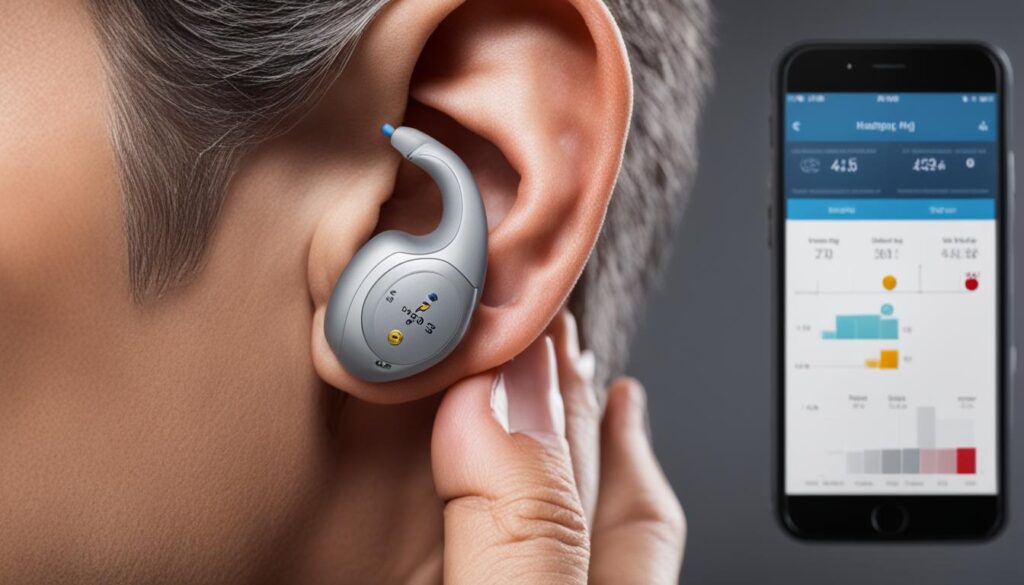
Understanding Disability Ratings
The VA bases disability ratings for hearing loss on specific criteria that gauge the extent of impairment and its impact on a veteran’s daily life. These ratings provide a comprehensive system to determine the appropriate level of compensation and benefits. Here is an overview of how the VA assigns disability ratings for hearing loss:
- 0% rating: A 0% rating signifies that the veteran has a hearing loss that does not warrant compensation but still requires ongoing monitoring.
- 10% rating: A 10% rating indicates a mild hearing loss that minimally affects a veteran’s ability to communicate and requires certain accommodations.
- 30% rating: A 30% rating applies to a moderate hearing loss that significantly impacts a veteran’s ability to hear and communicate.
- 50% rating: A 50% rating implies a moderate to severe hearing loss that affects a veteran’s daily functioning and communication abilities.
- 100% rating: A 100% rating is reserved for profound hearing loss or total deafness that severely limits a veteran’s ability to communicate and perform essential tasks.
Note that the specific criteria for each disability rating may vary slightly. It’s crucial to consult the VA’s schedule of ratings for hearing loss to gain a comprehensive understanding of the assessment process.
Maximizing Compensation for Hearing Loss
To ensure veterans receive the maximum compensation for their hearing loss, it’s essential to thoroughly prepare and support their claims with relevant evidence. Here are some tips to help veterans maximize their compensation:
- Compile comprehensive medical documentation: Gather all audiology evaluations, test results, and medical records related to your hearing loss. This documentation will provide the necessary evidence to strengthen your claim.
- Describe the impact of hearing loss on daily life: Clearly articulate how your hearing loss affects your ability to communicate, work, and engage in regular activities. Be specific and provide examples to illustrate the challenges you face.
- Seek professional assistance: Consider working with a veterans’ service organization (VSO) or an experienced disability attorney who can guide you through the claims process and ensure you present the strongest case possible.
- Attend all necessary medical evaluations: Cooperate fully with any audiology evaluations or medical exams requested by the VA. These assessments provide crucial information to support your claim for compensation.
By following these recommendations and providing robust evidence, veterans can improve their chances of receiving a fair disability rating and the appropriate compensation for their hearing loss.
| Disability Rating | Compensation and Benefits |
|---|---|
| 0% to 10% | No compensation, but access to ongoing monitoring and treatment |
| 10% to 100% | Varying levels of compensation based on the disability rating, ranging from a modest monthly payment to substantial financial support. Higher ratings may also provide access to additional benefits such as healthcare and vocational rehabilitation services. |
VA Disability Ratings for Tinnitus
The VA assigns disability ratings for tinnitus based on its impact on a veteran’s daily life. Ratings range from 0% to 10%, with higher ratings given if the tinnitus significantly affects the veteran’s ability to function. The severity of the tinnitus, as reported by the veteran, and any associated mental health disorders are taken into account during the rating process.
Veterans can file disability claims for tinnitus to establish its service connection and receive compensation for the condition. By providing medical evidence and supporting documentation, veterans can maximize their chances of receiving the benefits they deserve.
Treatment for Tinnitus
While there is no cure for tinnitus, the VA offers various treatment options to help veterans manage their symptoms and improve their quality of life. These options include:
- Sound therapy: Using external sounds, such as white noise or soothing music, to mask or distract from the tinnitus sounds.
- Counseling: Engaging in therapy sessions to learn coping strategies, reduce stress, and enhance overall well-being.
- Hearing aids or other devices: These devices can amplify external sounds and provide relief by reducing the perception of tinnitus.
The goal of treatment is to make the tinnitus less noticeable or to help veterans cope with their condition better. Veterans with tinnitus can receive disability benefits and access these treatment options through the VA. It is crucial to consult with healthcare professionals to determine the most suitable treatment plan for individual needs.
Assistance and Support for Veterans
At the VA, we are committed to providing comprehensive support for veterans with hearing loss and tinnitus. We understand the hardships that auditory conditions can bring, and that’s why we offer a range of services to assist and empower our veterans.
First and foremost, veterans can access audiology services, audiology health technicians, and speech-language pathologists across our VA sites of care. Our dedicated professionals are here to assist with screenings, prevention, treatment, and auditory rehabilitation for hearing loss and tinnitus management.
One of our primary goals is to improve the quality of life for veterans with auditory impairments. To achieve this, we provide access to cutting-edge technology such as hearing aids, cochlear implants, and other assistive devices. These devices can significantly improve hearing capabilities and enhance overall quality of life.

In addition to these tangible resources, we offer various resources and programs to help veterans maximize their compensation and benefits. Our knowledgeable staff can guide veterans through the claims process, ensuring that they receive the financial support they deserve for their service-connected hearing impairments.
Benefits of VA Assistance:
- Access to audiology services, audiology health technicians, and speech-language pathologists
- Screening, prevention, and treatment services for hearing loss and tinnitus management
- Hearing aids, cochlear implants, and other assistive devices
- Resources and programs to maximize compensation and benefits
We believe that no veteran should face the challenges of hearing loss or tinnitus alone. That’s why our dedicated team is here to provide the support and assistance needed to improve the lives of our veterans. Together, we can overcome the obstacles and ensure that every veteran receives the care they deserve.
| Benefits | Support Services |
|---|---|
| Access to audiology services | Screenings, evaluations, and treatment plans |
| Audiology health technicians | Guidance and assistance with hearing devices |
| Speech-language pathologists | Communication and speech therapy |
| Hearing aids | Fitment, adjustments, and ongoing support |
| Cochlear implants | Implantation, activation, and rehabilitation |
| Assistive devices | Technological solutions for better hearing |
| Resources and programs | Claims assistance and benefits optimization |
Research on Hearing Loss and Tinnitus
The VA recognizes the importance of research in advancing our understanding of hearing loss and tinnitus, as well as developing new treatments to improve the lives of veterans. The National Center for Rehabilitative Auditory Research (NCRAR) is at the forefront of these efforts.
Through extensive research, the NCRAR has made significant contributions to the field of audiology. One notable development is the Progressive Tinnitus Management (PTM) program, which offers effective strategies for managing tinnitus and improving quality of life for veterans.
In addition, the NCRAR’s research has shed light on the impact of blast exposure on decreased sound tolerance, providing valuable insights into the link between military service and hearing-related conditions. This research is instrumental in guiding preventive measures and enhancing diagnostic techniques.
Ongoing studies conducted by the NCRAR are focused on uncovering innovative treatment options for veterans with hearing loss and tinnitus. The goal is to develop interventions that address each individual’s unique needs and improve outcomes.
NCRAR Research Accomplishments
| Research Accomplishment | Impact |
|---|---|
| Development of Progressive Tinnitus Management (PTM) | Improved management strategies for tinnitus |
| Identification of blast exposure as a risk factor for decreased sound tolerance | Guidance for preventive measures and diagnostic techniques |
| Association between tinnitus severity and mental health disorders in veterans | Improved understanding of the impact of tinnitus on mental well-being |
Through ongoing research and collaboration, the VA remains committed to advancing the field of audiology and finding new ways to support veterans with hearing loss and tinnitus.

Common Causes of Hearing Loss in Veterans
Veterans can experience hearing loss due to a variety of factors related to their military service. These common causes include:
- Exposure to loud noises: Constant exposure to gunfire, explosions, and noisy aircraft can have a detrimental impact on hearing.
- Injuries from blasts: Veterans who have been near explosions or experienced blast injuries are at a higher risk of developing hearing loss.
- Environmental hazards: Exposure to jet fuel, chemicals, and other hazardous substances can contribute to hearing loss.
- Traumatic brain injuries: Veterans who have suffered a traumatic brain injury may also experience hearing impairments.
- Defective protective equipment: Faulty or inadequate earplugs and other protective gear can fail to provide adequate hearing protection.
It’s crucial for veterans to keep thorough medical records and documents from their time in service. These records can help establish the connection between their hearing loss and military service, making them eligible for service-connected hearing loss benefits and compensation.
Quote:
“The constant exposure to loud noises during active duty can significantly impact the hearing health of veterans, making it crucial to prioritize the prevention, identification, and treatment of hearing loss.” – Dr. Sandra Anderson, Audiologist
Risks and Impacts of Tinnitus in Veterans
Tinnitus, a condition characterized by the perception of ringing, buzzing, or other sounds in the ears when no external sound is present, can have significant impacts on the daily lives of veterans. It is often associated with anxiety, depression, and other mental health disorders, affecting their overall well-being and quality of life.
Veterans with tinnitus may experience distress, difficulty concentrating, and problems with sleep. The constant presence of the ringing or buzzing sounds can be highly disruptive, making it challenging for veterans to focus on their daily activities and tasks. Sleep disturbances caused by tinnitus can also lead to fatigue and decreased cognitive performance.
Research has shown that tinnitus rates have increased in active-duty service members over the years. This highlights the importance of early intervention and treatment options for veterans with tinnitus to prevent further deterioration of their condition and mitigate its impact on their lives.
The Department of Veterans Affairs (VA) recognizes the risks and impacts of tinnitus on veterans and offers a range of treatment options and disability benefits to support their well-being.
| Impacts of Tinnitus | Mental Health Disorders |
|---|---|
| Distress | Anxiety |
| Difficulty concentrating | Depression |
| Sleep problems | Stress |
If you are a veteran experiencing tinnitus, it is essential to seek medical help. The VA offers various treatment options, such as sound therapy and counseling, to help manage the symptoms and improve your quality of life. Additionally, the VA provides disability benefits for tinnitus to ensure you receive the necessary support and compensation for your condition.
Remember that you are not alone in dealing with tinnitus. There are resources and support available to help you navigate through the challenges and improve your well-being.
Access to Care for Veterans with Auditory Conditions
The VA is dedicated to providing comprehensive care for veterans with auditory conditions. We have a team of highly trained professionals, including audiologists, audiology health technicians, and speech-language pathologists, who deliver specialized services across our facilities. Our goal is to ensure that veterans with hearing loss and tinnitus have access to the screenings, prevention strategies, treatment options, and rehabilitation services they need.
At the VA, we understand the importance of early intervention and ongoing support for these conditions. Veterans can receive regular screenings to detect hearing impairments and tinnitus. By identifying auditory conditions early on, we can provide timely interventions to minimize the impact on daily life.
“We strive to offer comprehensive care and support to all veterans with auditory conditions, ensuring their well-being and quality of life.” – VA Audiology Department
Treatment Options
Our treatment options for hearing loss and tinnitus are tailored to meet the individual needs of each veteran. We offer a range of interventions, including:
- Hearing aids: We provide state-of-the-art hearing aids that are specifically designed to improve hearing for veterans with hearing loss. These devices are customized to fit comfortably and are programmed to address the unique needs of each individual.
- Cochlear implants: For veterans with severe to profound hearing loss, we offer cochlear implantation. These devices can restore a sense of sound by bypassing damaged portions of the ear and directly stimulating the auditory nerve.
- Tinnitus management programs: We have developed specialized programs, such as Progressive Tinnitus Management (PTM), to help veterans effectively manage their tinnitus symptoms. Our programs incorporate counseling, sound therapy, and other evidence-based techniques.
We cover the cost of hearing aids, cochlear implants, and other assistive devices for eligible veterans. Our goal is to improve hearing and enhance the quality of life for those affected by hearing impairments.
Compensation Claims
Furthermore, veterans can file compensation claims for their service-connected hearing impairments. We understand that hearing loss and tinnitus can interfere with a veteran’s ability to work and engage in daily activities. By filing a claim, veterans can seek financial support to offset any economic impact caused by their auditory conditions.
| Disability Rating | Monthly Compensation (as of 2021) |
|---|---|
| 0% | $0.00 |
| 10% | $144.14 |
| 30% | $435.69 |
| 60% | $1,131.68 |
| 100% | $3,146.42 |
Table: Monthly compensation rates for veterans with service-connected hearing impairments. The compensation rates vary based on the disability rating assigned by the VA.
Compensation claims can provide veterans with the financial support they need to manage their auditory conditions and improve their overall well-being. We encourage eligible veterans to explore this option as part of their journey toward optimal health.
At the VA, we are committed to providing the highest standard of care for veterans with auditory conditions. Our multidisciplinary team of experts is here to support veterans every step of the way, from diagnosis to treatment and ongoing management. We strive to ensure that all veterans with hearing impairments and tinnitus receive the care they deserve.
Maximizing VA Disability Benefits
When it comes to veterans disability benefits for hearing loss and tinnitus, maximizing your compensation is crucial. By following a few key steps, you can ensure that you receive the benefits and support you deserve.
Accurately File Disability Claims
Filing a disability claim with the VA is the first step towards obtaining your benefits. It’s essential to provide accurate and detailed information about your hearing loss or tinnitus. Include documentation of your service connection, medical evidence, and any supporting documents that demonstrate the impact of your condition on your daily life.
Provide Thorough Medical Evidence
Medical evidence plays a vital role in supporting your disability claim. Make sure to gather all relevant documentation, such as audiology evaluations, treatment plans, and records of any related medical visits. These documents help establish the extent of your impairment and demonstrate the necessity for compensation.
Seek Professional Help
Compiling a compelling disability claim can be complex and overwhelming. Consider seeking assistance from professional organizations or veteran service officers who specialize in navigating the claims process. They can provide invaluable guidance, ensure that your claim is strong, and increase your chances of receiving the maximum possible compensation.
Keep Detailed Records
It’s crucial to keep a record of all audiology evaluations, treatment plans, and any additional supporting documentation related to your hearing loss or tinnitus. These records serve as essential evidence throughout the claims process. Having organized and easily accessible documentation will help strengthen your case and improve your chances of maximizing your benefits.
Utilize VA Resources and Programs
The VA offers a range of resources and programs specifically designed to assist veterans in navigating the claims process and maximizing their benefits. Take advantage of these services to ensure you are aware of all available support options. Additionally, stay informed about any updates or changes in VA policies that may impact your eligibility or benefit entitlements.
By following these steps and leveraging the support provided by the VA, you can maximize your veteran compensation for hearing loss and tinnitus. Remember, you served our country, and you deserve to receive the benefits and care you need.
| Benefits of Maximizing VA Disability | Steps to Maximize Benefits |
|---|---|
| Higher financial compensation | Accurately file disability claims |
| Access to better treatment options | Provide thorough medical evidence |
| Enhanced support services | Seek professional help |
| Improved quality of life | Keep detailed records |

We are grateful for your service, and we want to ensure that you receive the maximum VA disability benefits for your hearing loss and tinnitus. By carefully following the steps outlined above and utilizing the resources available, you can optimize your veteran compensation and access the care you need.
Conclusion
VA disability benefits are available for veterans with hearing loss and tinnitus. These benefits provide compensation, treatment options, and support services to improve the lives of veterans affected by auditory conditions. Through the VA, veterans can access audiology evaluations, treatment for hearing loss, and resources for managing tinnitus.
It is essential for veterans to take advantage of the resources and programs offered by the VA to maximize their benefits. By accurately filing disability claims and providing thorough medical evidence, veterans can ensure they receive the compensation they deserve. Veterans should also keep records of audiology evaluations and treatment plans to support their claims.
By utilizing the services and support provided by the VA, veterans can receive the necessary care for their hearing loss and tinnitus. Whether it’s through the use of hearing aids, cochlear implants, or counseling for tinnitus management, the VA offers a range of options to improve veterans’ quality of life.
If you are a veteran affected by hearing loss or tinnitus, don’t hesitate to explore the VA disability benefits available to you. Take advantage of the resources and programs offered to maximize your benefits and ensure you receive the necessary care for your auditory condition. The VA is committed to supporting veterans and improving their quality of life.
FAQ
What types of disability benefits are available for veterans with hearing loss and tinnitus?
The VA provides disability compensation for veterans with service-connected hearing loss and tinnitus. These benefits are designed to provide financial support and access to treatment options for veterans affected by auditory conditions.
How is hearing loss considered service-connected?
Hearing loss is considered service-connected when it is linked to military service or worsened by it. Veterans must provide medical evidence and establish a connection between their hearing loss and their time in service to receive disability benefits.
What treatment options are available for veterans with hearing loss?
The VA offers various treatment options for veterans with hearing loss, including hearing aids and cochlear implants. These devices can improve hearing and quality of life for veterans with different levels of hearing impairment.
How can veterans file a disability claim for tinnitus?
Veterans can file a disability claim for tinnitus by providing medical evidence that establishes its service connection and impact on their daily life. The VA considers the severity of the tinnitus and any associated mental health disorders when assigning disability ratings.
What research has the VA conducted on hearing loss and tinnitus?
The VA has conducted extensive research on hearing loss and tinnitus to develop effective treatments and improve care for veterans. Notable accomplishments include the development of Progressive Tinnitus Management (PTM) and the identification of blast exposure as a risk factor for decreased sound tolerance.
How can veterans establish eligibility for VA disability benefits for hearing loss and tinnitus?
Veterans can establish eligibility for VA disability benefits by providing evidence that their hearing loss or tinnitus is related to their military service or has worsened as a result of it. Audiology evaluations are also necessary to determine the extent of impairment.
How does the VA assign disability ratings for hearing loss?
The VA assigns disability ratings for hearing loss based on the severity of the impairment as determined by audiometric test results. The ratings range from 0% to 100% and determine the level of compensation and benefits a veteran is eligible to receive.
How does the VA assign disability ratings for tinnitus?
The VA assigns disability ratings for tinnitus based on its impact on a veteran’s daily life and any associated mental health disorders. Ratings range from 0% to 10%, with higher ratings assigned if the tinnitus significantly affects the veteran’s functioning.
What treatment options are available for veterans with tinnitus?
While there is no cure for tinnitus, the VA provides various treatment options to help veterans manage their symptoms. These options include sound therapy, counseling, and the use of hearing aids or other devices to mask the tinnitus sounds.
What support services does the VA provide for veterans with hearing loss and tinnitus?
The VA provides comprehensive support for veterans with hearing loss and tinnitus, including access to audiology services, audiology health technicians, and speech-language pathologists. Veterans can receive screening, prevention, treatment, and rehabilitation services to improve their hearing and quality of life.
What research has the VA conducted on hearing loss and tinnitus?
The VA conducts research on hearing loss and tinnitus to advance understanding and develop new treatments. The National Center for Rehabilitative Auditory Research (NCRAR) leads these efforts and has made significant contributions to the field of auditory research.
What are the common causes of hearing loss in veterans?
Hearing loss in veterans can be caused by various factors related to military service, including exposure to loud noises, injuries from blasts, environmental hazards, and traumatic brain injuries. The use of faulty protective equipment can also contribute to hearing loss.
What are the risks and impacts of tinnitus in veterans?
Tinnitus can have significant impacts on the daily lives of veterans, often leading to anxiety, depression, and other mental health disorders. Veterans with tinnitus may experience distress, difficulty concentrating, and problems with sleep.
How can veterans access care for auditory conditions through the VA?
The VA provides comprehensive care for veterans with auditory conditions, including access to audiology services, screening, prevention, treatment, and rehabilitation services. The VA covers the cost of hearing aids, cochlear implants, and other assistive devices for eligible veterans.
How can veterans maximize their VA disability benefits for hearing loss and tinnitus?
Veterans can maximize their VA disability benefits by accurately filing disability claims, providing thorough medical evidence, and seeking professional help in compiling their claims. Keeping records of audiology evaluations and treatment plans can also be beneficial.
What VA disability benefits are available for veterans with hearing loss and tinnitus?
The VA provides disability compensation for veterans with hearing loss and tinnitus. These benefits offer financial support and access to treatment options to improve the lives of veterans affected by these auditory conditions.
Taylor brings a dynamic and analytical perspective to the Deaf Vibes team, focusing on research-driven content that educates and informs. With an unquenchable curiosity for new developments, policies, and social issues affecting the deaf and hard-of-hearing community, Taylor’s writing is a crucial resource for readers seeking to navigate these areas. Whether breaking down legal rights, highlighting educational opportunities, or offering guides on accessible technology, Taylor’s work is an invaluable asset to those seeking to empower themselves and others. Taylor’s commitment to accuracy and depth ensures that our readers have access to reliable and actionable information.
Navigating the VA System
Understanding Bilateral Hearing Loss VA Rating Criteria
Yearning for clarity on how the VA evaluates bilateral hearing loss? Uncover the key insights to help veterans navigate the rating criteria maze.
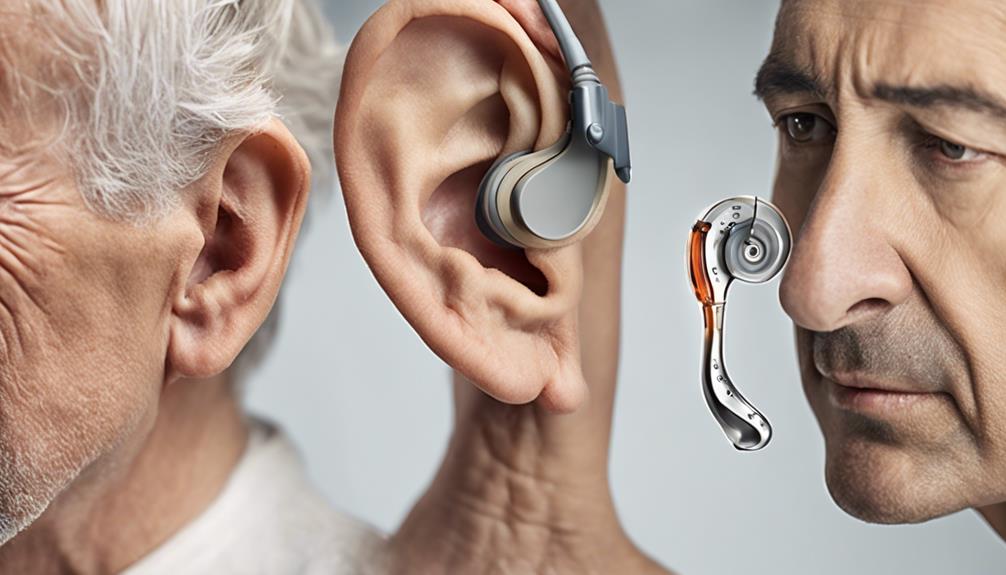
Diving into the specifics of the Bilateral Hearing Loss VA Rating Criteria, we delve into the complex elements that form the basis of disability evaluations for veterans. It’s vital for veterans to grasp the method the VA uses to assess the degree of hearing impairment in both ears as they maneuver through the claims procedure.
By delving into the specific tests used and the range of potential ratings, we gain insight into how to present a strong case for compensation.
Stay tuned as we unravel the complexities of VA rating criteria for bilateral hearing loss, shedding light on the path to securing the benefits our veterans rightfully deserve.
Key Takeaways
- VA rating for bilateral hearing loss based on speech discrimination and pure tone tests.
- Ratings start at 10% and increase with severity, influencing benefits.
- Total hearing loss may qualify for Special Monthly Compensation (SMC).
- Comprehensive evaluation by an audiologist crucial for accurate rating.
Definition of Bilateral Hearing Loss
Bilateral hearing loss is a condition characterized by impairment in both ears, affecting an individual's ability to perceive sounds from various sources. Veterans frequently encounter this condition due to exposure during military service, such as gunfire, explosions, or hazardous environments. Diagnosing bilateral hearing loss necessitates a thorough evaluation by a licensed audiologist, including assessments like speech discrimination and pure tone threshold tests.
To file VA claims for bilateral hearing loss, veterans must establish a clear connection between their current condition and the in-service events that caused or worsened their hearing impairment. The VA rating criteria for bilateral hearing loss are stringent and require specific documentation to determine the severity of the condition accurately.
Understanding the nuances of how bilateral hearing loss is defined and assessed is crucial for veterans navigating the VA claims process to ensure they receive the appropriate recognition and support they deserve for their service-related hearing difficulties.
VA Rating Schedule Overview
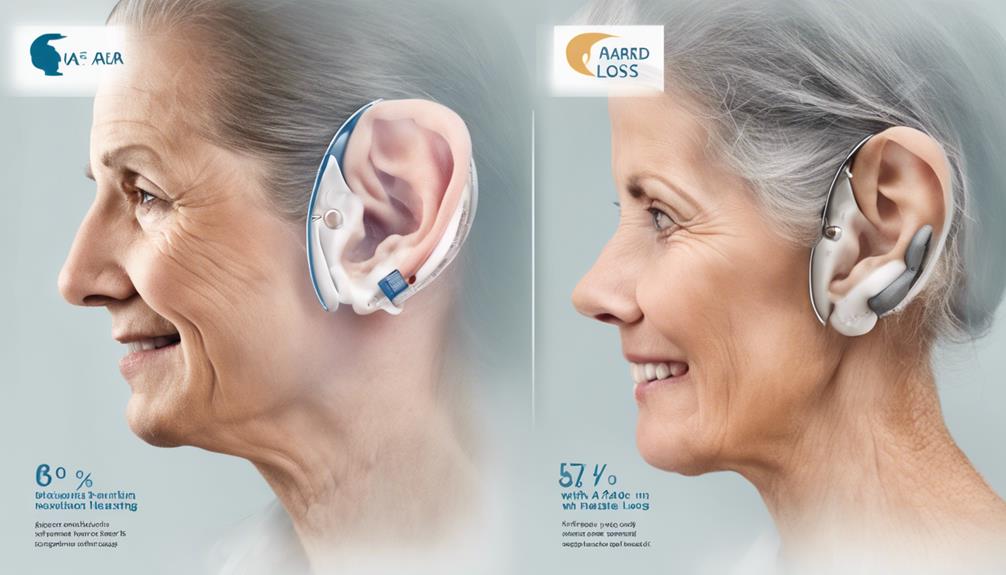
When examining the VA Rating Schedule for hearing loss, one must consider specific criteria that evaluate the severity of hearing impairment in both ears. The VA rating schedule utilizes a combination of factors to determine the disability rating for bilateral hearing loss:
- Ratings are based on speech discrimination and pure tone threshold average test results for both ears.
- The VA assigns a Roman numeral designation on a grid chart to establish the disability rating.
- Veterans typically receive a 10% disability rating for bilateral hearing loss, with the potential for higher ratings depending on specific test outcomes.
- Bilateral hearing loss ratings play a crucial role in determining the level of compensation and benefits veterans may receive from the VA.
Understanding these components of the VA rating schedule is essential for accurately assessing the impact of bilateral hearing impairment on veterans' lives and ensuring they receive appropriate compensation and support.
Factors Influencing VA Ratings
Factors influencing VA ratings for hearing loss include a combination of speech discrimination and pure tone threshold average test results for both ears. The severity of bilateral hearing loss in each ear determines the disability rating percentage assigned by the VA.
By combining the ratings for both ears, the VA calculates the overall disability compensation for bilateral hearing loss. If individuals believe they deserve a higher rating, they can submit additional evidence, such as test results from a licensed audiologist, to support their claim.
In cases of total hearing loss in both ears, Special Monthly Compensation (SMC) may be granted in addition to regular disability compensation. Understanding how speech discrimination and pure tone threshold averages impact VA ratings is crucial for veterans seeking fair compensation for their bilateral hearing loss.
Impact of Hearing Loss Severity

The severity of hearing loss directly influences the disability rating assigned by the VA, impacting veterans' benefits and compensation. When evaluating hearing loss severity for VA disability rating purposes, several key factors come into play:
- Ratings are determined based on speech discrimination and pure tone threshold averages.
- More severe hearing loss results in higher disability ratings, potentially leading to increased compensation.
- Bilateral hearing loss in both ears can contribute to a higher disability rating due to the impact on overall hearing ability.
- The assessment of hearing loss severity is typically conducted by a licensed audiologist to ensure accuracy and consistency in determining the appropriate disability rating.
Understanding the implications of hearing loss severity on VA benefits is crucial for veterans, as it directly affects the level of compensation they may receive. For those experiencing significant hearing impairments, the disability rating criteria play a vital role in determining eligibility for additional support, such as unemployability benefits.
Evaluation Process for VA Rating
To evaluate bilateral hearing loss for VA rating, specific tests like the Maryland CNC Test and Pure Tone Audiometric test are utilized, with the VA employing a grid chart to assign a Roman numeral designation based on the degree of hearing impairment. The rating process considers speech discrimination and Puretone threshold averages to assign disability ratings accurately. Veterans must undergo a comprehensive hearing exam conducted by a licensed audiologist for a precise diagnosis. It's crucial to note that diagnoses solely by a primary care doctor are not considered sufficient evidence for VA claims related to hearing loss. Below is a table outlining the evaluation process for VA rating of bilateral hearing loss:
| Evaluation Process | Description | Importance |
|---|---|---|
| Maryland CNC Test | Evaluates speech discrimination ability to understand speech in noise environments. | Critical for VA assessment |
| Pure Tone Audiometric test | Measures hearing sensitivity across different frequencies to determine hearing thresholds. | Essential for rating |
| Comprehensive Hearing Exam | Conducted by a licensed audiologist to assess the full extent of hearing loss and its impact. | Crucial for accurate rating |
Frequently Asked Questions
How Does the VA Calculate Bilateral Hearing Loss?
We calculate bilateral hearing loss by combining results from both ears to determine a single disability rating. This rating is based on the average of pure tone thresholds and speech discrimination scores.
A grid chart assigns a Roman numeral designation according to the severity of the impairment. The most common rating for veterans with bilateral hearing loss is 10%.
Additional evidence can support a higher disability rating when warranted.
How Is Bilateral VA Rating Calculated?
We determine bilateral VA ratings by evaluating the Puretone threshold average and speech discrimination scores for both ears. These test results are combined to assign a single disability rating reflecting the severity of hearing loss in both ears.
Veterans can submit additional evidence to support a higher disability rating. The VA uses a percentage scale to rate bilateral hearing loss, ensuring fair evaluation and appropriate compensation for affected individuals.
What Is Bilateral Mild to Moderate Hearing Loss?
Bilateral mild to moderate hearing loss signifies a condition where both ears exhibit mild to moderate hearing difficulties. This can impede our ability to perceive sounds clearly, especially in noisy settings or conversations. Speech recognition and understanding may also be affected, leading to communication challenges.
Causes can vary from aging to noise exposure or medical issues. Individuals with this condition might find benefit from hearing aids or other assistive devices to enhance their hearing.
What Is the Most Common VA Rating for Hearing Loss?
We often see a 10% VA rating for hearing loss, which is quite common among veterans. This rating is typically given for mild to moderate hearing loss.
It's just one of the many ratings ranging from 0% to 100% based on the severity of the condition. Higher ratings or total hearing loss could lead to additional compensation.
It's important to understand how these ratings are determined for veterans dealing with hearing loss.
Conclusion
In conclusion, the VA rating criteria for bilateral hearing loss is crucial for veterans seeking disability benefits. Understanding the impact of hearing impairment in both ears and the factors influencing VA ratings is key to receiving appropriate compensation.
The evaluation process can be complex, but with the right evidence, veterans can potentially qualify for higher disability ratings.
Stay tuned for more insights on navigating the VA disability benefits system for hearing loss.
Jamie is one of the creative forces behind the words that resonate with our audience at Deaf Vibes. With a passion for storytelling and advocacy, Jamie delves into topics that matter deeply to the deaf and hard-of-hearing community. Jamie’s articles are crafted with empathy, insight, and a commitment to positive change, from exploring the latest advancements in hearing technologies to shedding light on the everyday challenges and victories of those within the community. Jamie believes in the power of shared stories to inspire action, foster understanding, and create a more inclusive world for everyone.
Navigating the VA System
How Does the VA Rate Hearing Loss for Veterans?
Keen to uncover the intricacies behind how the VA rates hearing loss for veterans?
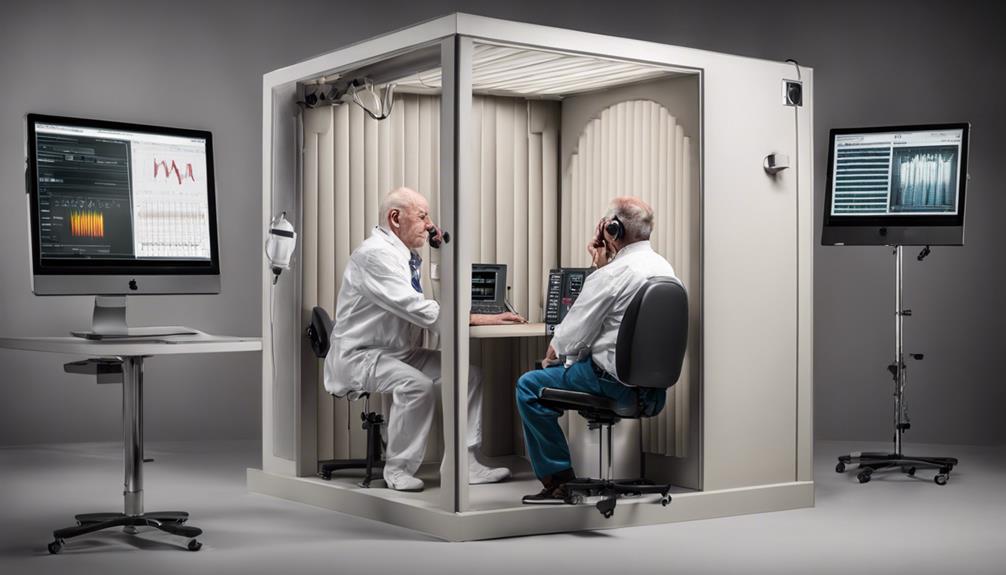
Understanding the process by which the VA evaluates hearing loss for veterans may appear both simple and complex simultaneously.
From understanding the criteria used for evaluating hearing loss severity to uncovering the various factors that impact disability ratings, there's a complexity that demands attention.
Let's explore the nuances of how the VA calculates these ratings and what veterans should be mindful of when navigating this system for their benefit.
Key Takeaways
- VA rates hearing loss based on pure tone threshold tests.
- Disability ratings range from 0 to 100%.
- Severity impacts disability rating, up to 100%.
- Accurate diagnosis by audiologist crucial for VA compensation.
VA Hearing Loss Rating Criteria
When determining VA disability ratings for hearing loss, veterans are evaluated based on the results of pure tone threshold tests. These tests measure the softest sounds a person can hear at different frequencies.
The VA assigns disability ratings for hearing loss on a scale from 0 to 100 percent, with most veterans receiving a 10% rating. Using a grid chart, the VA designates impairment levels corresponding to different degrees of hearing loss, helping determine the appropriate disability rating.
To qualify for VA benefits, veterans must establish a connection between their hearing loss and their military service. This service connection is crucial in demonstrating that the hearing loss is related to conditions experienced during service.
Determining Hearing Loss Severity

Determining the severity of hearing loss for VA disability ratings relies on the results of specific tests conducted by licensed audiologists. The pure tone threshold test is a crucial tool in diagnosing hearing loss and assessing its severity. VA disability ratings are assigned based on a grid chart that correlates the test results with an impairment designation, ultimately determining the disability rating a veteran will receive. The severity of hearing loss directly impacts the disability rating granted by the VA, with veterans potentially receiving up to a 100% disability rating. Most commonly, veterans with hearing loss are rated at 10%. It is essential for veterans seeking VA compensation for hearing loss to undergo these specific tests administered by a licensed audiologist to ensure an accurate diagnosis and appropriate disability rating.
| Hearing Loss Severity | Impairment Designation | VA Disability Rating |
|---|---|---|
| Mild | Minimal | 0-10% |
| Moderate | Moderate | 30-60% |
| Severe | Marked | 70-100% |
Understanding VA Compensation Levels
Understanding the VA's hierarchy of compensation levels for hearing loss is crucial for veterans navigating the disability claims process. The VA rates hearing loss on a scale from 0 to 100%, with most veterans typically falling within the 0-10% range.
The severity of hearing loss and its impact on daily life play a significant role in determining the disability compensation level assigned by the VA. Veterans with profound hearing loss may receive a higher disability rating, potentially up to 100%, based on specific criteria, such as pure tone threshold tests, and the level of functional impairment experienced.
The VA utilizes these assessments to accurately gauge the degree of hearing loss and assign appropriate compensation levels to eligible veterans. Having a clear understanding of the VA rating system for hearing loss is essential for veterans to effectively file disability claims and secure the benefits they rightfully deserve.
Factors Impacting VA Hearing Loss Ratings
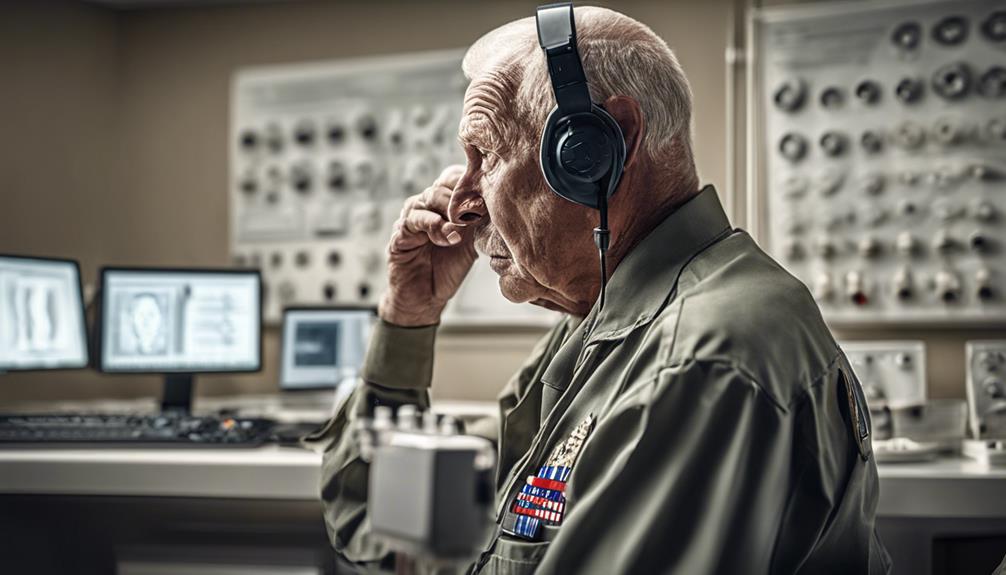
Factors influencing VA hearing loss ratings include the results of pure tone threshold tests administered by licensed audiologists. These tests assess the severity of sensorineural hearing loss, which is common among veterans due to noise exposure during service.
Additionally, speech discrimination ability plays a crucial role in determining the impact of hearing loss on communication. Veterans experiencing tinnitus may also receive higher disability ratings, as this condition often accompanies hearing loss and can exacerbate functional impairment.
The VA utilizes a grid chart to match the degree of impairment designated by the test results with specific disability ratings, ranging from 0% to 100%. Individuals with profound hearing loss or significant functional limitations are more likely to receive higher disability ratings, reflecting the greater impact of their condition on daily life activities.
Understanding these factors is essential for veterans seeking an accurate VA rating for their hearing loss.
Tips for Successful VA Claims
To increase the likelihood of a successful VA disability claim for hearing loss, it's crucial to submit a well-documented claim supported by evidence of in-service noise exposure. Providing a current diagnosis of hearing loss from a licensed audiologist is essential for establishing service connection and obtaining VA benefits.
Including a detailed nexus opinion linking the in-service noise exposure to the current hearing loss diagnosis strengthens the claim's validity for VA disability compensation. During Compensation & Pension examinations, ensuring accurate information about the impact of hearing loss on daily life can support the approval of the claim.
Additionally, utilizing lay testimony from family members or fellow service members to describe the noticeable effects of hearing loss can provide additional evidence for a successful VA claim. By following these tips and presenting a comprehensive case with supporting documentation, individuals can enhance their chances of a favorable outcome in their VA disability claim for hearing loss.
Frequently Asked Questions
How Does VA Determine Hearing Loss Rating?
We determine hearing loss ratings by assessing pure tone threshold test results. A licensed audiologist conducts these tests to determine the severity of the hearing loss.
Ratings range from 0 to 100 percent, with most veterans typically receiving a 10% rating for hearing loss.
The VA utilizes a grid chart to assign disability ratings, with ratings exceeding 10% being less common.
What Are the 4 Types of Hearing Loss?
We've four main types of hearing loss:
- Conductive hearing loss stems from issues in the outer or middle ear, hindering sound from reaching the inner ear.
- Sensorineural hearing loss, the most prevalent type, results from damage to the inner ear or auditory nerve.
- Mixed hearing loss combines aspects of both conductive and sensorineural hearing loss.
- Lastly, Central hearing loss arises from problems in the central nervous system affecting sound processing.
What Is the Configuration of Hearing Loss?
When considering the configuration of hearing loss, it's crucial to understand the specific pattern of hearing loss across different frequencies. This can include flat, sloping, rising, or cookie-bite patterns.
These configurations impact speech understanding and communication abilities differently. Through audiometric testing, we determine the configuration, which aids in selecting appropriate hearing aids or treatment options.
Understanding these patterns is vital in providing effective support for individuals with hearing loss.
Is 30% Hearing Loss a Disability?
Yes, 30% hearing loss is considered a disability. It signifies a moderate level of impairment in hearing ability, impacting communication and daily functioning significantly. Veterans with this rating may struggle to hear conversations in noisy settings, necessitating aids for assistance.
The VA acknowledges 30% hearing loss as a substantial impairment warranting compensation and support. This disability rating reflects a genuine need for assistance due to the impact on hearing ability.
Conclusion
In conclusion, understanding how the VA rates hearing loss for veterans is crucial for ensuring proper compensation and treatment. By carefully considering the criteria, severity, compensation levels, and factors impacting ratings, veterans can navigate the claims process more effectively.
It's important to gather all necessary evidence and documentation to support your case. Stay tuned for more tips and insights on maximizing your VA benefits.
Jamie is one of the creative forces behind the words that resonate with our audience at Deaf Vibes. With a passion for storytelling and advocacy, Jamie delves into topics that matter deeply to the deaf and hard-of-hearing community. Jamie’s articles are crafted with empathy, insight, and a commitment to positive change, from exploring the latest advancements in hearing technologies to shedding light on the everyday challenges and victories of those within the community. Jamie believes in the power of shared stories to inspire action, foster understanding, and create a more inclusive world for everyone.
-
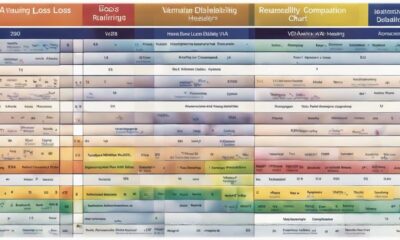
 Navigating the VA System1 month ago
Navigating the VA System1 month agoVA Hearing Loss Rating Chart: Understanding Disability Compensation
-

 Therapies and Interventions1 week ago
Therapies and Interventions1 week ago10 Auditory Processing Goals for Effective Speech Therapy
-

 Vetted2 months ago
Vetted2 months ago15 Best Oticon Hearing Aids to Improve Your Hearing in 2024
-

 Navigating the VA System1 month ago
Navigating the VA System1 month agoUnderstanding Bilateral Hearing Loss VA Rating Criteria
-

 Sign Language1 week ago
Sign Language1 week agoMastering the Art of Signing Letters in Sign Language
-

 Tinnitus1 month ago
Tinnitus1 month agoVA's Rating System for Tinnitus and Hearing Loss Explained
-

 Sign Language2 weeks ago
Sign Language2 weeks agoSign Language Emoji Translator: How to Communicate With Gestures
-

 Sign Language3 months ago
Sign Language3 months agoMedical Sign Language PDF: A Comprehensive How-To Guide

















